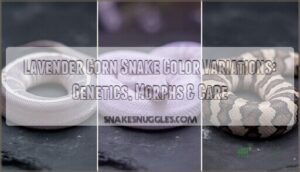This site is supported by our readers. We may earn a commission, at no cost to you, if you purchase through links.

Basic varieties cost around $20-40, while rare color patterns can hit $200 or more.
But here’s the catch – the snake’s just your down payment.
You’re looking at $300-500 for proper setup costs including a terrarium, heating equipment, and accessories.
Monthly feeding runs about $10-20 since these snakes eat every week or two.
Factor in annual vet visits at $50-100, and your first-year investment totals roughly $400-700.
After that, you’ll spend around $150-300 yearly on maintenance.
The real magic happens when you understand which factors actually drive these costs.
Table Of Contents
- Key Takeaways
- How Much is a Corn Snake?
- Average Price of Corn Snakes
- Considerations for Adoption
- Corn Snake Habitat Costs
- Corn Snake Feeding Costs
- Corn Snake Healthcare Expenses
- Buying Corn Snakes
- Frequently Asked Questions (FAQs)
- Does corn snakes bite hurt?
- What snakes does Petco sell?
- Does Petsmart have corn snakes?
- What is a cheap snake?
- What is the average price of a corn snake?
- Are corn snakes good pets?
- Are corn snakes illegal?
- Do corn snakes like to be held?
- How often should I handle my corn snake?
- What is the lifespan of a corn snake?
- Conclusion
Key Takeaways
- You’ll pay $20-200 for the snake itself, but expect $300-500 in setup costs for your terrarium, heating equipment, and accessories – the real expense isn’t the snake, it’s creating their proper habitat.
- Your first-year investment totals $400-700, then drops to $150-300 annually for maintenance, feeding, and vet visits – corn snakes are affordable long-term pets once you’ve covered initial expenses.
- Monthly feeding costs stay predictable at $10-20 since corn snakes only eat frozen mice every 1-2 weeks, making them one of the most budget-friendly reptile pets for ongoing care.
- You’re committing to 15-20 years of ownership, so factor in potential emergency vet bills ($800-1,200) and consider pet insurance at $10-20 monthly to protect against unexpected medical costs.
How Much is a Corn Snake?
When you’re shopping for a corn snake price, expect to pay anywhere from $20-$100 for standard varieties.
Average corn snake price sits around $50, but rare morphs value can skyrocket to $500 or more.
Morph price trends show exotic patterns like Palmetto commanding premium prices, while basic colors stay budget-friendly.
Breeding cost impact affects availability – common morphs flood the market, keeping costs low.
Smart shoppers know negotiating snake price works better at reptile shows than pet stores.
Corn snake investment varies wildly based on genetics.
Initial setup expenses can also add $150-$300 to the overall cost.
Ready to explore what drives these corn snake cost differences?
Average Price of Corn Snakes
Most corn snakes cost between $30 and $100, but you’ll find prices vary wildly based on several factors. Your average corn snake price depends heavily on the morph you choose and where you shop.
Don’t let fancy morphs fool you—a healthy corn snake doesn’t need to break the bank.
Here’s what influences corn snake cost:
- Basic wild-type corn snakes – $25 to $50 from most sellers
- Popular morphs like Albino or Okeetee – $90 to $200 range
- Rare genetic variations – $300 to $700 for unique coloration costs
- Age and size – Baby snakes typically cost less than adults
- Breeder reputations – Established breeders charge premium prices for quality genetics
Morph Market value drives most pricing decisions, with genetic influence determining final costs.
Setting up their enclosure also contributes to the overall expense, with enclosure costs ranging from $75 to $300 or more.
Considerations for Adoption
You’ll face several important choices when getting a corn snake, from choosing between adoption and purchase to understanding the long-term costs.
These decisions affect both your wallet and your snake’s wellbeing for the next 15 years.
Adoption Versus Purchasing Options
Adoption benefits include lower costs and helping rescue snakes find homes, typically costing $50-150.
Buying corn snake from reputable breeder offers extensive morph availability but increases your initial investment to $30-1,000+. Breeder reputation matters when purchasing—research their practices thoroughly.
The corn snake cost varies substantially between adoption centers and specialized breeders. The pet snake market is projected to reach $7.21 billion by 2032, indicating a strong and growing interest in these reptiles.
Consider your budget and desired genetics when choosing your corn snake price range.
Long-Term Care Commitment
Before diving into corn snake cost calculations, you’ll need to understand what you’re signing up for.
These reptiles aren’t short-term pets – their lifespan expectancy reaches 15-20 years. That’s two decades of ongoing costs, time commitment, and future planning for your snake ownership expenses.
Consider these longterm care realities:
- Daily monitoring of temperature, humidity, and snake behavior
- Weekly feeding with appropriately-sized prey items
- Monthly habitat maintenance including substrate changes and cleaning
- Handling frequency of 2-3 times weekly to maintain socialization
Associated Setup Costs
Beyond the adoption fee, you’ll face initial setup costs that add up quickly.
Your enclosure needs proper Tank Size (20-30 gallons costs $120-$150), Heating equipment runs $50-$150, and Lighting Needs another $20-$50.
Don’t forget Substrate Type ($10-$20), Hides & Decor ($20-$100), plus a thermometer ($10-$15).
Budget $200-$400 total for everything.
Corn Snake Habitat Costs
Setting up your corn snake’s habitat will cost between $150 and $500, with the terrarium being your biggest expense.
You’ll need to budget for a proper enclosure, heating equipment, substrate, and essential accessories to create a safe home for your new pet.
Terrarium Size and Prices
Before diving into reptile tank shopping, you’ll need the right snake enclosure size. A 20-gallon terrarium works for juveniles, while adults require 40-gallon enclosures for comfort.
Here’s your terrarium budget breakdown:
- Basic glass reptile tanks – $50-$150 depending on gallon conversion needs
- Custom builds with material impact – $200-$500 for premium features
- Used tanks from local sellers – $30-$80 for budget-conscious owners
- Tank dimensions matter – larger enclosures cost more but provide better space
Selecting the right terrarium is essential for your snake’s well-being.
Heating and Misting Equipment
Getting the right heating equipment sets the foundation for your corn snake’s health. You’ll need basking bulbs ($10-$20) to create that essential warm spot, while heat mats provide belly heat from below.
Ceramic heaters work great for nighttime warmth without disturbing your snake’s sleep cycle. Don’t forget thermostat control—it prevents dangerous overheating and saves you from constantly checking temperatures.
A basic reptile heating pad runs $15-$20, making it budget-friendly. Many owners find specialized heat sources are essential for maintaining ideal temperatures.
Misting systems help maintain proper humidity levels, though they’re optional for beginners. Quality heating equipment prevents costly health issues down the road.
Decor and Accessories
Your corn snake’s enclosure needs the right decor to thrive. Essential accessories include hides and caves for security, climbing branches for exercise, and proper water dishes for hydration.
Choose substrate types that maintain humidity while being easy to clean. Background decor adds visual appeal without cluttering the space.
Don’t forget a thermometer and hygrometer to monitor conditions alongside your heating system. Quality corn snake hides are essential for their well-being.
Quality habitat improvements typically cost $20-$100 depending on your selections.
Corn Snake Feeding Costs
You’ll spend about $10 to $20 each month feeding your corn snake frozen mice or rats.
This cost stays consistent throughout your snake’s life, making it one of the most predictable expenses you’ll face as an owner.
Main Food Source and Prices
In the context of snake feeding, your corn snake’s diet revolves around reptile feeder mice.
Feeder Mice Prices range from $0.30 to $0.85 per frozen mouse, depending on size. Food Size Matters – choose prey matching your snake’s thickest section.
Frozen vs. Live is simple: frozen mice prevent injuries and cost less. Smart owners enjoy Bulk Food Savings by purchasing 25-50 mice at once.
Thawed rodents are generally considered safe. Monthly snake food costs typically run $10-50.
Feeding Schedule
Your snake’s feeding schedule depends on its age and size.
Hatchlings need frozen mice every 5-7 days, while adults eat monthly.
Match prey size to your snake’s thickest section.
Frozen vs. live isn’t just safer—it’s cheaper too.
Skip supplements when feeding whole fuzzies.
Consistent timing helps regulate their shedding cycle and keeps feeding frequency predictable.
Corn Snake Healthcare Expenses
You’ll need to budget for regular vet visits and potential emergency care when you own a corn snake.
Healthcare costs can range from $50 for annual checkups to $200 or more for emergency treatments, making pet insurance worth considering at $10-20 per month, as it can help mitigate healthcare costs.
Annual Checkup and Costs
During your corn snake’s lifetime, annual costs for preventative care typically range from $50-$100.
A thorough vet examination includes health monitoring and often parasite screening to catch issues early. While corn snakes don’t require routine vaccinations like other pets, vaccination costs may apply if specific treatments become necessary.
Regular vet visits guarantee your snake stays healthy and can prevent expensive emergency situations later.
As long-term pets, corn snakes’ total costs can range from $2,400 to $7,900 over their lifetime. Consider pet insurance to help manage unexpected medical care expenses, as specialized reptile health care can become costly without coverage.
Emergency Care and Expenses
Sudden illness or injury costs can hit your wallet hard when you least expect it.
Emergency vet visits for corn snakes range from $800-$1,200, especially when you need specialized reptile medical care.
Think respiratory infections, parasite treatment, or unexpected injuries that require immediate attention.
Preventative measures like proper habitat maintenance help, but emergencies still happen.
Finding an experienced reptile vet beforehand saves precious time.
Insurance coverage through pet insurance can offset these steep emergency vet visits.
Importance of Pet Insurance
Pet insurance for reptiles offers coverage options that protect you from costly unexpected illnesses and emergency treatments.
Policy costs typically range $10-20 monthly, but this small investment provides tremendous peace of mind.
Quality insurance covers preventative care, routine checkups, and major medical expenses that could otherwise devastate your budget.
When researching your corn snake morph cost and overall reptile pet price, factor snake insurance into your snake price guide calculations.
Buying Corn Snakes
You’ll find corn snakes available through pet stores, reptile breeders, and online retailers, with prices varying based on your location and the seller’s reputation.
Your choice of where to buy affects both the initial cost and the quality of your future pet, so research each option carefully before making your purchase.
Seller Selection
After considering healthcare costs, finding the right seller becomes your next priority.
You’ll encounter several options when searching for a corn snake for sale, each with distinct advantages.
- Reputable Breeders – Offer health guarantees and detailed morph information
- Online Retailers – Provide vast selection with shipping options
- Local Stores – Allow hands-on inspection before purchase
Research seller reviews and ask about their breeding practices before committing.
Geographic Availability and Pricing
Regional pricing varies substantially across different areas.
Southeastern states offer lower corn snake costs due to abundant local breeders, while urban markets charge 20-30% more than rural regions.
Import costs affect international availability, with tight regulations increasing prices abroad.
Online vendors provide broader morph availability, though geographic location still influences final reptile price and shipping expenses for your snake pet cost.
Methods of Finding Corn Snakes for Sale
Several reliable sources make finding your perfect corn snake straightforward.
You’ll discover quality options through these popular channels:
- Local Breeders: Direct access to healthy snakes with detailed care guidance
- Online Retailers: Convenient shopping with extensive morph selections and shipping
- Reptile Expos: Hands-on experience meeting breeders and comparing prices
- Rescue Adoption: Cost-effective option giving snakes second chances at loving homes
Pet stores and classified ads offer additional purchasing opportunities.
Look for breeders who provide detailed lineage histories.
Frequently Asked Questions (FAQs)
Does corn snakes bite hurt?
Corn snake bites feel like tiny pinpricks or needle pokes.
You’ll experience minimal pain since they’re non-venomous with small teeth.
The bite might bleed slightly but won’t cause serious harm or lasting discomfort, as the snakes are non-venomous.
What snakes does Petco sell?
Walking into Petco’s reptile section, you’ll typically find ball pythons, corn snakes, and kingsnakes available. However, their snake inventory changes frequently based on supplier availability and seasonal demand patterns.
Does Petsmart have corn snakes?
PetSmart typically carries corn snakes, though availability varies by location and season.
You’ll find basic morphs priced around $50-$
Call your local store first to check current inventory before making the trip to ensure they have corn snakes.
What is a cheap snake?
Picture yourself browsing pet stores on a budget – you’ll find corn snakes are among the cheapest options.
Normal morphs cost just $30-50, making them perfect starter snakes that won’t break your wallet.
What is the average price of a corn snake?
You’ll typically pay around $50 for an average corn snake, though prices range from $30 for basic morphs to $200+ for rare varieties. Standard pet store snakes cost between $30-$100 depending on coloration.
Are corn snakes good pets?
Yes, corn snakes make excellent pets.
They’re docile, easy to care for, live up to 15 years, and only need feeding every 1-2 weeks.
Perfect for beginners seeking a low-maintenance reptile companion.
Are corn snakes illegal?
Corn snakes aren’t illegal in most U.S. states, but you’ll need to check local laws.
Some cities and counties have restrictions on keeping reptiles as pets, so verify regulations before purchasing one.
Do corn snakes like to be held?
My neighbor’s corn snake, Charlie, actually seeks out handling sessions and wraps gently around her arm.
Most corn snakes enjoy being held once they’re comfortable with you—they’re naturally calm and rarely bite.
How often should I handle my corn snake?
Handle your corn snake 2-3 times per week for 10-15 minutes each session.
Start slowly with young snakes, avoiding handling during shedding or after feeding.
Regular, gentle interaction helps build trust and keeps them comfortable with human contact, which is crucial for their well-being and your safety, and can be considered a key part of regular care.
What is the lifespan of a corn snake?
Wondering how long your scaly friend will stick around?
You can expect your corn snake to live 15-20 years with proper care, making them excellent long-term companions that’ll grow alongside you.
Conclusion
Owning a corn snake is like planting a tree – the initial investment grows into years of rewarding companionship.
When asking "how much is a corn snake," remember you’re budgeting for both the $20-200 snake and ongoing care totaling $400-700 your first year.
Smart planning prevents financial surprises down the road, research breeders thoroughly, invest in quality equipment upfront, and budget $150-300 annually for maintenance.
Your new scaly friend will thank you with decades of fascinating behavior and minimal daily care requirements, making it a worthwhile investment for years of rewarding companionship and minimal daily care.















